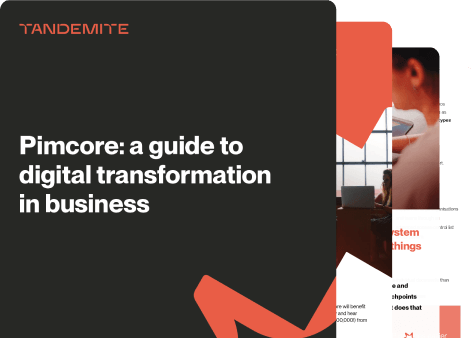Unlock the potential of AI in PIM systems – explore the possibilities with us

A growing trend among large organizations is the integration of AI into PIM to maintain market relevance and outmaneuver the competition. PIM's capabilities can now extend beyond product information storage and management to include analysis, self-governing data quality, intelligent suggestions, and process optimization. This isn't science fiction – artificial intelligence is reshaping PIM and how product data is managed.
Keeping your product content aligned, current, and engaging is becoming increasingly difficult. The large scale of data, format diversity, multilingual requirements, and pressure to personalize the customer journey create a complicated scenario. If you're working toward scaling your online operations, integrating your digital systems, and expanding globally without falling into product content disarray, you're on the right track.
We invite you to discover in this article how AI can support your business through these complex challenges. We’ll show how intelligent algorithms are changing the landscape of Product Information Management, providing your business with real-world benefits such as sales growth, increased efficiency, and lasting customer relationships. Are you ready to transform your approach?
#1 use case: Smart product data enrichment in PIM systems
AI can take over product data completion and correction
How much time does your team spend adding specifications, checking descriptions, or ensuring consistency in format? Tasks like these may seem small, but they quickly add up. AI allows your PIM system to manage these processes autonomously, freeing up your team for high-impact work.
Think of a scenario where a new product is added to your system. Instead of going through the tedious task of entering all the details manually — such as measurements, materials, or weight — AI evaluates the available content, including images, supplier specifications, and similar items from your database. It then automatically fills in the missing fields, helping you bring new products to market faster. With AI, your PIM can become a proactive tool that maintains high-quality, complete product data.
Example: A new dress is listed in your online clothing store. Thanks to AI, your PIM system analyzes the photo and extracts key details — color (for example, red), cut (for example, pencil), and material (for example, cotton). If any of this data is missing from the supplier, AI fills it in automatically. By comparing it to similar dresses in your catalog, it can also propose extra product attributes like sleeve length or neckline shape.
AI is capable of generating product descriptions using images and specifications
And there’s more — it produces custom, engaging descriptions by interpreting product visuals and data. This means you’re no longer limited to standard manufacturer copy but can offer customers content that is both informative and appealing.
Another practical example: When a new smartphone is added to your Product Information Management system, AI steps in to analyze its image and technical specs — like the processor, RAM, and camera resolution. It then creates a well-crafted description that focuses not only on features but also on the value for the user: “With a powerful processor and large RAM, this smartphone delivers a fluid experience even with multiple apps running. Its advanced camera features let you take stunning photos, preserving life’s best moments in top quality.”
#2 use case. Personalized recommendations: Your intelligent product advisor
AI can interpret customer data and suggest the most suitable products
Remember a time when a sales assistant seemed to understand your preferences instantly? That personalized touch is now available through AI. With AI integrated into Product Information Management, businesses can offer smart, personalized guidance by analyzing user behavior and suggesting the best products for each individual.
When a customer lands on your website and explores a particular coffee machine model, it’s a key opportunity. While a traditional PIM system might register the visit, a PIM enhanced with AI dives deeper. It evaluates the customer’s browsing history, previous purchases, cart contents, and even abandoned items to suggest the most relevant products to that customer.
For example, when a user buys a coffee machine, the intelligent PIM system can use their profile to recommend:
- Fitting accessories: such as filters, a descaler, and a grinder.
- Related products: like a variety of coffee beans or capsules.
- Complementary items: such as elegant coffee cups or a milk frother.
What’s more, AI enhances the shopping experience by recommending products that share key features with those the customer is interested in. So, if someone is checking out a smartphone with specific qualities – such as a big screen, efficient battery, and advanced camera – AI can offer comparable models or practical accessories, like protective covers, glass screen shields, or Bluetooth headphones, to match their preferences.
Here's another example: A customer browsing branded running shoes. AI can propose different models from the same brand that have different benefits, like superior cushioning for long runs. It can also recommend matching items like running outfits, pulse monitors, or water flasks to complete the experience.
Customized recommendations raise the potential for additional purchases, such as cross-selling and up-selling. At the same time, they make customers feel valued and understood, strengthening their loyalty. When the products suggested actually meet their needs, the entire shopping process becomes more effective and satisfying.
#3 use case. Product classification optimization: A Clearer structure for your catalog
AI can organize your products into accurate categories and subcategories
Effective navigation starts with a well-defined category structure.
Managing categories and assigning products manually often takes a lot of time and leads to mistakes. AI solves this by automatically and logically organizing products, improving how customers browse and how businesses manage their offerings.
If you have doubts about how your products are organized or you're finding it hard to locate specific items in your large online catalog, AI’s ability to automatically classify items can bring clarity, efficiency, and consistency to your system.
With AI integrated into your PIM platform, adding a new model of women’s shoes becomes faster and more accurate. By analyzing features like type (e.g., running), material (e.g., mesh), sole design, and color, the system automatically places the product in the right category — starting with “Women’s footwear,” narrowing to “Sports shoes,” and even down to specific segments like “Road running shoes” or “Light trainers,” if the product details match. Your Product Information Management system works independently to keep your online sales environment in order. By solving problems related to poor product visibility, you create a smoother shopping experience and increase your chances of closing a sale.
At the same time, proper categorization improves stock management, supports category-level sales tracking, and helps shape your marketing strategies. With the help of AI, your catalog becomes not only more organized but also more accessible and powerful for your business and your customers.
#4 use case. Automatic translations: Taking your product global
AI helps convert product content into multiple languages
One of the critical steps in international expansion is making your product information available in different languages. A modern PIM system equipped with AI tools can remove this barrier, helping you reach new audiences faster.
Example: You manage an online store specializing in unique handmade products. The German description of your ceramic cup includes its origin story, artistic inspiration, and materials. AI can translate this into Spanish while keeping both the detailed content and emotional tone, helping Spanish-speaking customers enjoy the same meaningful description.
Automating your translations is a strategic move that enables fast and cost-effective entry into global markets. You can experiment in new regions without large investments, and once success is visible, shift to higher-quality versions prepared by native speakers. In this process, AI serves as a practical and powerful starting point for your brand’s global reach.
As your PIM system adopts these advanced features, it transforms from a centralized database into a smart product management engine. It becomes a vital part of your strategy for growing sales, optimizing operations, and reinforcing your market position.
Interested in a smooth and efficient PIM implementation powered by AI and automation? We’re here to support you.
We develop intelligent PIM solutions built on three core systems:
✅ Pimcore
✅ Akeneo
✅ Ergonode
Our expert team is available to provide answers and craft personalized solutions to fit the unique nature of your business. Together it's easier. Let's dive into how AI is making PIM systems smarter and more intuitive.






